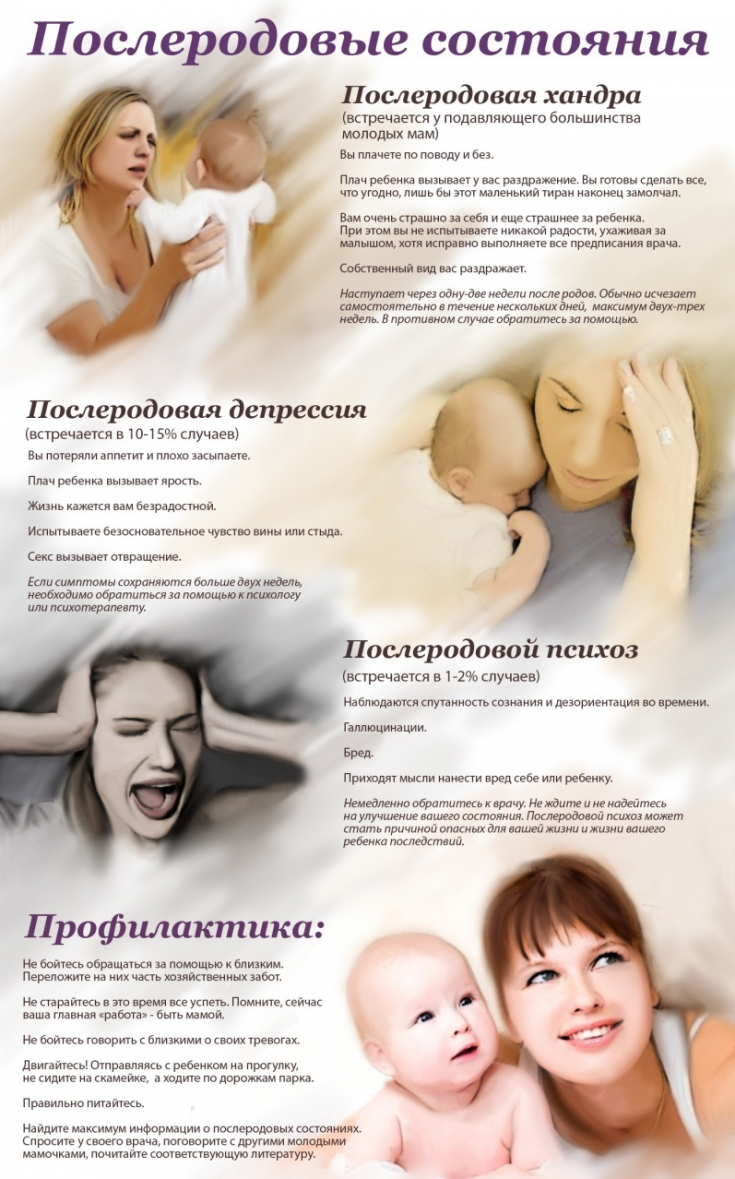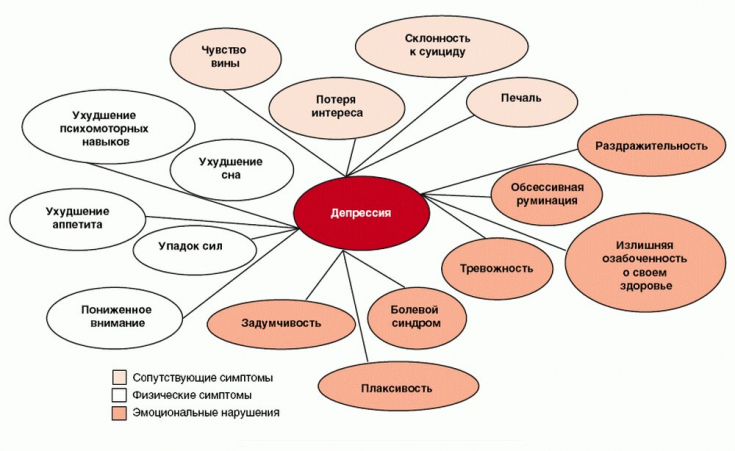According to European psychologists, postpartum depression — one of the most frequent and complex problems of new mothers. The number of women suffering from this psychological disorder is growing every year. Instead of the happiness of motherhood, they experience a feeling of fatigue and weakness, get irritated and cry for any reason. The most unpleasant thing is that such a state continues for a long time — several months, and sometimes even years. Everyone suffers: mother, child, husband, relatives and friends. Let's figure out how to solve the problem.
- Postpartum depression: causes and possible consequences
- By what signs can you recognize a depressive state
- How to deal with depression: 8 helpful tips
- About postpartum depression and how to combat
Postpartum depression: causes and possible consequences
The causes of postpartum depression can be roughly divided into two groups — physiological and psychological. The body of a newly-made mother produces a whole complex of active substances that affect her behavior. But hormonal restructuring has always been — and in ancient times, and in the last century, and now. But the problem of postpartum depression has become acute only in recent decades. It is impossible to explain it by hormones alone.
Follow us on Instagram
It is worth paying attention to the changes taking place in the worldview of a modern woman who has given birth to a child:
-
Change of priorities. Modern women are active. They work, build a career, go in for sports, find time and energy for a hobby. The birth of a child becomes a kind of milestone, after which a new life begins. It often no longer has room for old habits. It's hard to comprehend.
-
Professional degradation. To remain in demand as a specialist, you have to constantly learn new skills. A young mother has neither the time nor strength for and the realization of missed opportunities is depressing.
-
Social isolation. Girlfriends, friends, noisy gatherings and clubs are a thing of the past. Now the only thing that matters is the baby. A woman begins to feel that she is alone in this world, and her social life is forever lost to her. In her mind, she understands that the child will grow up and everything will change, but now it seems vague.
-
Disappointment in motherhood. Girls are taught from a young age that motherhood — this is the main happiness in life. Growing up, they idealize the image of a mother with a baby. The encounter with reality is an acute disappointment. It turns out that moments of happiness are fleeting, and the hard work of care becomes easier.
-
Envy of "happy" moms. Glamorous photos of joyful moms and smiling babies can evoke feelings of inferiority in irritated, sleep-deprived women.

Postpartum depression — it's not simply melancholy and irritability. The condition is aggravated by guilt towards the child. A woman thinks she is the worst mother in the world. She makes even more efforts to provide the best for the child. As a result, he gets terribly tired, begins to blame himself and despise himself.
— her child. Instead of warmth, security and joy, he receives alarm signals from the outside world: his mother is unhappy, irritated and sad. The kid becomes restless, capricious, whiny. What basic trust in the world can speak in such a situation?

Read also: Postpartum depression: how celebrity moms deal with it
By what signs can you recognize a depressive state
The first symptoms of depression may appear even during pregnancy, and then become a habitual state. The most common are:
-
Anxiety and helplessness. Mom feels insecure, worries about any reason, because she is not free, she has to take care of the child, and opportunities for this are limited.
-
Bursts of rage. If the baby cries, the exhausted mother may become angry. She feels like this nightmare will never end.
-
Anger at the surroundings. This is a mixed feeling of fear and anger. Everyone gives advice to a young mother. The woman smiles and nods, but seems internally: it seems that everyone is watching, evaluating how good a mother she is, and condemning for any reason.
-
Tearfulness. The number of fears that a young mother has to deal with is enormous. No wonder she's her eyes wet.
-
Indifference to appearance.In the cycle of worries, a woman ceases to take care of herself. There is only one reason — chronic fatigue. All the forces go to the baby, they simply don remain on themselves.
-
Decreased libido, fear of sex. A woman after childbirth feels ugly, clumsy, driven. Intimate life — the last thing she's worried about. Due to deep complexes, fear of possible sex may appear.

It seems that the husband, relatives and friends should perfectly understand the condition of the young mother and vied with each other to offer help. But in reality everything is far from so. Often the husband helps a little, believing that his care — Earn Money. Relatives are quite capable of reproaching the "careless mother." And friends disappear from sight, forgetting to call even on holidays. All this aggravates the depressive state of the woman. No wonder she starts hating everyone even more.
Read also: Out depression — best proven methods
How to deal with depression: 8 helpful tips
If you've noticed symptoms of postpartum depression, don't give up and act. This condition will not go away on its own and will only get worse if nothing is done. The best option — go to a psychologist. At the first consultation, he will carry out a primary diagnosis and, if is unable to influence the causes of depression, he will refer to another specialist.
If you don't have the opportunity or desire to seek professional help, heed the advice of experienced moms:
-
Get rid of illusions. Pictures from the Internet and mother-in-law adjectives «this our time» lies through and through. Images in social networks — these are projections of the desired, and not real. And your mother-in-law suffered exactly the same way in the first months of her baby's life. Take it for granted: motherhood — hard and often unpleasant work. Award for him — the first successes of the baby, his smile, the words "Mom, I" love you. We'll have to wait.
-
Believe that maternal happiness is possible. It won't look at all like in advertisements for diapers. But it will be your own happiness, created by you personally. It's worth working for.
-
Be sensitive to yourself. If you get sick with the flu, you wouldn't even bother fighting the infection by forcing yourself to work harder or better. Depression — the same disease. Stop biting yourself. Better sympathize and treat yourself with love, care and understanding.
-
Relax. Perfectionism — an unnecessary quality for a tired woman. Don try to embrace the immensity. A husband can also vacuum and cook dinner. Lie down with baby and rest. You deserve it!
-
Talk to husband. It seems like they all just have to understand how hard it is for you. In fact, your husband has no idea how difficult it is for you to find time to vacuum and cook dinner. It's time to redistribute responsibilities or hire an assistant.
-
Don't hesitate to ask for help. Surely a mother or mother-in-law can set aside one evening of a week to be with the baby while you go to the hairdresser or just take a nap.
-
Forge "alliances" with other mothers. If there are no helpers, you can try to negotiate with other young mothers walking with you on the playground. Make friends with families, periodically taking babies from each other to give time to rest.
-
Make life easier. Stop being torn between your baby and stove. In priority — child. For dinner, you can have scrambled eggs, salad or soup from semi-finished products.
While the child is small, life won't get easier. Yes will never be easy. Therefore, the most reasonable — look for something that helps you relax, relieve nervous tension. If it's self-care or a bath, be sure to set aside an evening of the week for beauty treatments or a steam room. If you're into sports or yoga, don't skip workouts for any reason. Think of it as a prevention and treatment for depression, and don't forget to take your medication.
Read also: How to help loved ones with depression: 5 important rules
Highlights on postpartum depression and how to combat
Postpartum depression — this is a whole complex of changes in the well-being and behavior of a woman, provoked by the influence of hormones and psychological factors. If it is difficult to argue with hormones, then the psychological state can be improved by simple methods:
-
Taking care of yourself. Think of yourself as a person who has been stricken by illness. It's temporary, but it's worth taking care of yourself.
-
Rest. There are many ways to make life easier. Choose the ones that seem most suitable for you, free up time for relaxation.
-
Redistribution of responsibilities. Involve your husband in child care and household chores. You do not must pull everything on yourself.
Follow us on Telegram
Remember, every penny and every second spent on forming your good mood is an investment in the future of your child. Right now, he most of all needs a cheerful and kind mother. Become happier to make your baby successful!
Read also: The harm of self-criticism: 9 ways to get rid of dissatisfaction with yourself
You may be interested in: Stone massage or stone massage - what is it? Watch the video.








Add a comment